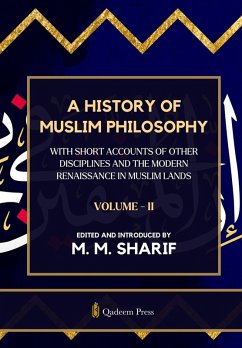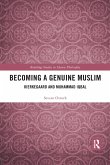Delve into the profound depths of Islamic intellectual heritage with A History of Muslim Philosophy - 2 by M. M. Sharif, an illuminating journey through centuries of philosophical evolution in the Muslim world. This comprehensive volume not only captures the essence of Muslim thought but also provides insightful glimpses into other disciplines and the modern renaissance in Muslim lands, making it an indispensable resource for scholars, students, and anyone passionate about philosophy and history. Volume II of this seminal work spans from the fall of Baghdad in 1258 to the threshold of the 18th century. The fall of the 'Abbasid Caliphate, a pivotal moment in Islamic history, sets the stage for the exploration of a rich tapestry of intellectual and cultural developments that followed. This volume is meticulously structured into thematic sections, each offering an in-depth analysis of significant philosophers, theologians, Sufi mystics, and their contributions to various fields of knowledge. Explore the profound ideas of theologians and philosophers like Ibn Taimiyyah, whose works continue to influence contemporary Islamic thought. Understand the intricate interplay between faith and reason that characterized this period and how it shaped the discourse in Muslim societies. Immerse yourself in the spiritual wisdom of Sufi masters such as Jalal al-Din Rumi, whose poetry and teachings transcend time, and Mahmüd Shabistari, al-Jili, and J¿mi, whose contributions to Sufi philosophy are meticulously analyzed. Discover the mystical paths that offered a unique perspective on divine love and existential contemplation. Learn about the lives and ideas of prominent philosophers like Jalal al-Din Dawwani and Ibn Khald¿n, the latter being celebrated for his groundbreaking work in sociology and historiography. The book also sheds light on the intellectual revival that blended philosophy with metaphysical insights, particularly through the School of Ispahan and ¿adr al-Din Shirazi (Mulla ¿adra). Understand the evolution of political thought through the eyes of Ibn Khald¿n and others who dissected the dynamics of power, governance, and society. The comprehensive analysis extends to other disciplines, offering detailed accounts of advancements in language, literature, fine arts, social studies, and the sciences. The latter part of the book transitions to the modern renaissance in Muslim lands, highlighting key figures and movements that sparked intellectual and cultural revivals across the Near and Middle East, North Africa, and South and South-East Asia. From Muhammad Bin 'Abd al-Wahhab in Arabia to Sir Sayyid Ahmad Khân in Indo-Pakistan, the renaissance section chronicles the resurgence of Muslim thought and its adaptation to contemporary challenges. Concluding with an exploration of the influence of Muslim thought on both Western and Eastern intellectual traditions, the book underscores the enduring legacy of Islamic philosophy and its contributions to global civilization.
Hinweis: Dieser Artikel kann nur an eine deutsche Lieferadresse ausgeliefert werden.
Hinweis: Dieser Artikel kann nur an eine deutsche Lieferadresse ausgeliefert werden.








